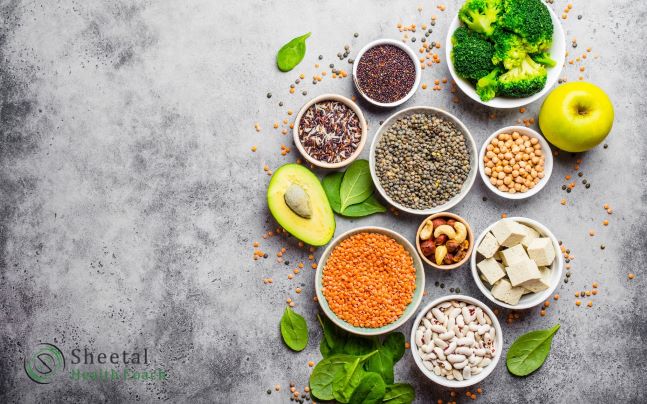Integrative & Functional Nutrition
This emerging field emphasizes food and nutritional supplements’ role in curing the mind, body, and spirit for optimal wellness. Traditional medicine prescribes several drugs for depression. Complementary and alternative medicine (CAM) can treat that same depressed person using dietary or herbal supplements. Integrative medicine, a rapidly growing profession, combines the best of conventional and CAM to help patients reach optimal health and wellness.
Integrative and functional nutrition exceeds dietary recommendations. It addresses intestinal imbalances and considers genetic susceptibility, ecological impact, and physiological and psychological aspects including sickness. Interventions are prioritized based on internal and external criteria so the recommendations are personalized.

Functional nutrition treats the person, not the ailment. It tailors’ health optimization to your DNA, lab data, lifestyle, and more. Because everyone is different, meal plans are not generic.
Integrative dietitians combine medical nutrition therapy with integrative and functional medicine modules. Dietitians, clients, and other healthcare practitioners must work together. The team creates a whole-food diet that can include vitamins and herbs for everyone.
Your initial hour-long session includes a complete nutrition assessment where your health history, diet, digestion, food allergies, and wellness goals are examined. After analysis, you’ll know how to reach your goals. A follow-up program monitors your development and adjusts as needed.
Managing chronic diseases and health goals requires working with an integrative nutritionist to promote nutritional and digestive health. Before your first visit, maintain a food journal.
Integrative Nutrition Benefits
Improved nutrition and digestion can help:
- Neurodevelopmental issues like autism or ADHD
- Encourage cancer prevention.
- Stroke
- Food allergies/intolerance
- Depression
- Diabetics
- Diet
- autoimmunity
- IBS, colitis, and Crohn’s disease are gastrointestinal disorders.
- Celiac disease
Integrative Nutrition
Nutritionists now advise patients on macronutrients, micronutrients, energy expenditure, and food labels. Integrative or holistic nutrition studies the idea that diet and food can cure the body physically and emotionally. Examples:
- Diet Style: These include fad diets like Paleo and raw food. Nutritionists must comprehend these patterns, explain why they can or cannot work, and effectively advise clients.
- Food-Mood Link: Much research has studied how foods, whole-food supplements, or both affect behavior, depression, irritability, and emotional eating.
- Food Cravings and Addictions: Treating clients’ overall philosophy includes teaching them how to handle food cravings. Nutritionists analyze the type of food, the timing of the craving, what is happening in the head during the craving, the events surrounding the craving, the customer’s emotional state, and the production of neurotransmitters connected to cravings and addictions. Food addictions are now studied. Current research suggests that food addiction is “hard-wired” in the brain, like drug addiction.
- Phytonutrients & Antioxidants: Integrative nutrition relies on antioxidants, but dietitians must grasp the whole-body approach. They must comprehend cellular antioxidants and phytonutrients and gene expression. For instance, how antioxidants turn genes on or off and affect the body. This equation also considers dietary nutrient synergy.

RDs must remember integrative medicine’s whole-person approach when designing plans for integrative or holistic nutrition clients. When designing a strategy, emotional, physical, and dietary demands must be considered. Many clients have similar issues, but RD-client communication and aim achievement can vary.
RDs review the client’s medical history and medications, including over-the-counter ones. They ask about current and former food habits, lifestyle patterns between food, work, and play, client support systems, family dynamics, food or drug allergies, and more. Dietitians should also use vitamins, minerals, anti-inflammatory diets, and herbs.
Health-promoting nutrients
Nutrients boost norepinephrine, dopamine, and serotonin. Nutrients can affect neurotransmitter production. Depressed clients could have emotional eating episodes, therefore RDs should ask. Dietitians should keep talking during treatment. Vitamin and mineral supplements can ease mild to moderate depression. Omega-3s, S-Adenosylmethionine (SAMe), folic acid, and B vitamins can regulate mood, according to research.
- Omega-3 fatty acids: further studies suggest they can reduce depression symptoms. Omega-3 deficiency or imbalance increases depression risk. Symptom-relieving omega-3 fatty acid dosage research is undertaken. Vegetarian clients can benefit from flaxseed or oil supplements.

- B vitamins, particularly folic acid and B12, are essential for SAMe production. B12 levels are low in the elderly, vegans, and malnourished. Vitamin B6 makes serotonin, so take the recommended quantity. One B-complex supplement per day can help with depression. Folic acid deficiency is connected to depression.
Folic acid deficiency lowers serotonin, a brain chemical that promotes happiness.
- SAMe: Caregivers believe SAMe is a powerful natural antidepressant. Norepinephrine, dopamine, and serotonin metabolism depend on SAMe, the body’s methyl donor. Depression impairs synthesis. Supplementation can boost brain monoamine levels, neurotransmitter-receptor binding, and brain cell membrane fluidity. Effects should determine patient dosage.
The integrative functional nutritionist at Livlively will improve your dietary choices as it has a direct effect on everything from your sleep patterns and circadian rhythms to your posture.

